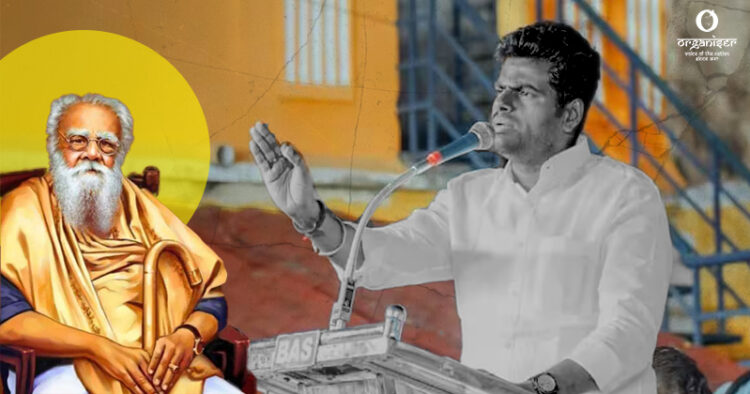Addressing a massive crowd on the 56th day of his ‘En Man, En Makkal’ yatra, Tamil Nadu BJP Chief K Annamalai asserted that the ruling DMK party’s actions were “anti-people” and accused them of erecting flag masts near temples with plaques proclaiming ‘there is no God.’ He pledged that if the BJP assumed power, it would be the “last day” for the Hindu Religious and Charitable Endowments (HR and CE) department.
Annamalai’s statement was met with applause as he expressed his commitment to removing statues, flags, and plaques that promoted anti-God ideas near temples across the state. This statement was seen as a direct reference to the statue of Dravidar Kazhagam founder Periyar E V Ramasamy, which stands opposite the Ranganathar Swamy temple in Srirangam.
The TN BJP leader emphasised that all flag masts with such messages would be uprooted on the day the BJP secured victory in the state, implicitly referring to the DMK’s previous actions of removing BJP flags, citing disapproval from Muslim and Christian communities. He declared, “The BJP is taking a vow. Once the BJP comes to power in Tamil Nadu, the first task would be to remove that plaque and flagpole outside the temple.”
Annamalai went on to announce plans for the installation of statues of Azhwars, Nayanmars, Tamil scholars, and prominent historical figures who contributed to the freedom movement. Notably, the BJP leader emphasised that statues like the one with the controversial inscription “He who created the God was a fool, he who spreads his name is a scoundrel and the who worships him is a barbarian” would be replaced. Statues of revered Tamil scholar Thiruvalluvar and those who sacrificed their lives during the freedom movement would be erected and worshipped instead.
The BJP’s announcement has stirred considerable debate and controversy in Tamil Nadu, as it raises questions about the preservation of historical and cultural symbols and the boundaries between freedom of expression and religious sentiment. The BJP’s promise to remove Periyar statues in front of Hindu temples, if they come to power, is bound to be a central point of contention in the state’s political landscape.
தமிழகத்தில் பாஜக ஆட்சி அமைக்கும் போது ஸ்ரீரங்கத்தில் ஆழ்வார்கள் சிலை வைக்கப்படும்#EnMannEnMakkal #Annamalai pic.twitter.com/M2t702sw91
— En Mann En Makkal (@EnMannEnMakkal) November 7, 2023
In Tamil Nadu, a fiery political battle has erupted over the presence of a 12-feet-high statue of EV Ramasamy, commonly known as Periyar, placed outside the famous Srirangam temple. The installation of this statue, which was carried out in December 2006 by K. Veeramani, the head of the Dravidar Kazhagam, an organisation often described as “anti-Hindu,” has triggered intense debates and accusations. Periyar, a prominent figure in the Dravidian movement, advocated rationalism and social reform, but his views on religion, particularly Hinduism, have remained contentious.
The Dravidian Kazhagam (DK), founded by Periyar, has had a profound influence on Tamil Nadu’s political landscape, with both the DMK and AIADMK emerging as splinters of the original movement. These parties have been in power for over five decades, dating back to 1967. All the statues associated with Periyar, including the one outside the Srirangam temple, have official patronage and were funded by taxpayers’ money. The controversial aspect lies in the statements made by some of these political leaders and parties, which often include derogatory remarks about Hindu deities while claiming to champion rationalism.
The recent statement by Tamil Nadu BJP President K Annamalai has added fuel to the fire. Annamalai announced that if the BJP were to come to power, they would remove the Periyar statue in front of the Srirangam temple. He argued that such statues hurt the sentiments and beliefs of Hindu devotees and accused the DMK of attempting to eradicate “sana tana dharma,” a reference to traditional Hinduism, by all means.
Annamalai further questioned whether Chief Minister MK Stalin and his son and minister, Udhayanidhi Stalin, could succeed in eradicating a religious tradition that had withstood the invasions of Mughals and the British colonial rule.
The DMK government’s denial of permission to the BJP to hold a meeting in Karur has also added another layer of controversy to this ongoing political tussle. The DMK cited concerns that the area was dominated by Muslims and Christians, with numerous mosques and churches, and the potential for communal clashes. This decision, despite the Supreme Court and High Court rulings, has been seen as an attempt to appease minority communities.
Justice Jayachandran of the Madras High Court criticised the DMK government’s stance, emphasising that roads and streets should be accessible to people of all religious backgrounds, irrespective of their beliefs. The judge argued that a dominant religious group in a particular area should not be used as a reason to prohibit religious festivals or processions of other groups.
In response to the BJP’s growing popularity in the state, DMK has reportedly resorted to arresting BJP leaders and levying false charges against those involved in the BJP’s yatra (political procession). The ongoing raids conducted by the Income Tax and Enforcement Directorate on DMK ministers have further added to the political tension.
According to a BJP functionary named Prakash, the DMK’s efforts to hinder the BJP’s yatra may backfire, as the growing support for the BJP in the state seems to be undeterred by these obstacles.
The controversy surrounding the Periyar statue and the political accusations in Tamil Nadu highlight the delicate balance between freedom of expression, religious sentiments, and the evolving political landscape in the state. It is a situation that continues to capture the attention of both the public and political observers.



















Comments